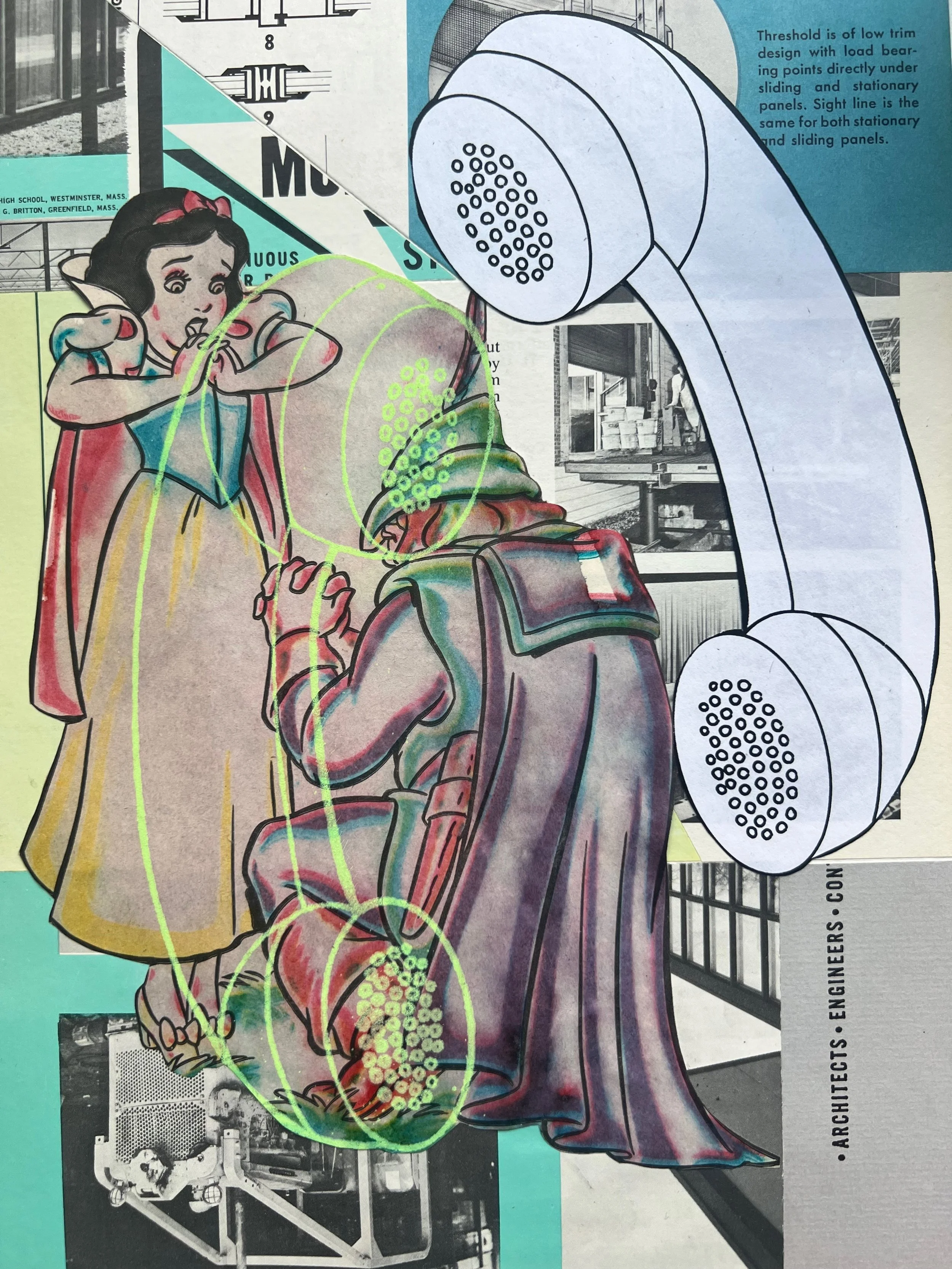Please Leave A Message
by Ed Wolf
Kirk Read, The cords used to be twenty feet long, analog collage, 2024. Courtesy of the artist.
Please Leave A Message
Ed Wolf | AUG 2024 | Issue 36
I took the answering machine out of its box, set it on the table, and read through the operating manual before recording my first message.
“Hello this is Ed Wolf but you’ve reached my…” I stopped and hit rewind. Too wordy.
“Hello this is Ed Wolf and I can’t come to the phone right now because…” I stopped and hit rewind. Don’t need reasons why I’m not picking up.
“Hello this is Ed Wolf…” and paused. Do I need my last name? Do I need my name at all? Do I need to say my phone number? Do I need to ask them to leave theirs?
I called some friends who already had answering machines and listened. One talked way too fast. The other wanted my number, even if I thought they had it.
“Hello, this is Ed…” Not loud enough.
“Hello, this is Ed…” Too whiny.
I stopped trying. I didn’t even want an answering machine but now that I was a Shanti volunteer and had people with AIDS relying on me, I felt I had to.
“Hello, this is Ed. I’m sorry I can’t get to the phone right now…” Too much!
Bob called me from Manhattan last week to say Russ had been quite ill and they’d finally gotten him to St. Vincent’s where two days later they told him he had GRID—Gay-Related Immune Deficiency, the original name for the disease now known as AIDS—and Bob said he called repeatedly and couldn’t get through and told me to get an answering machine, everyone in Manhattan had one. It made staying in touch so much easier.
“Hi! This is Ed and…” Too perky.
I said “Hi” out loud several times. Then “Hello.”
I’ll go with “Hi;” it sounds more friendly.
“Hi, this is Ed. Hi, this is Edward.” Maybe just Ed.
If I had an answering machine, I could not only get any messages from people who called when I wasn’t home, but also listen to who was leaving the message and pick up if I wanted to. That could be a plus.
“Hi! This is Ed. Sorry I missed you. Please leave a message.”
That’s what I finally came up with after eleven tries.
Later that night, Bob called again. He was crying. He said Russ had almost died earlier that day and if I wanted to see him one last time I better get back to New York as soon as possible.
I tossed and turned all night, and in the morning decided I couldn’t go. I didn’t have the money and couldn’t get the time off, plus I knew Russ wouldn’t want to say goodbye, wouldn’t want me to see him lying in a hospital bed. I knew Bob would get upset and try to get me to change my mind, but when I called to tell him I wasn’t coming, I was so relieved, because I got his answering machine instead.
Ed Wolf has told stories at the Sundance Film Festival, the Berlin International Film Festival, the Kiev International Film Festival, and Side-by-Side LGBT Film Festival in St. Petersburg, Russia. In San Francisco he’s performed at Oasis, The Lost Church, National Queer Arts Festival, the Contemporary Jewish Museum, Verdi Club, The Swedish American Hall, Brava Theatre, Yerba Buena Center for the Arts and many others. His writing has appeared in numerous publications, including Beyond Definition: New Writing from Gay and Lesbian San Francisco; Rebel Yell: Gay Men of the South; The AIDS Reader; Queer and Catholic; Fray: Sex and Death; Christopher Street and The James White Review. He was nominated for a Pushcart Prize in 1996.
Kirk Read is a writer and analog collage artist in Portland, OR. He is the author of How I Learned to Snap and his collage work has been featured in Contemporary Collage Magazine and at Le Mieux Galleries in New Orleans.
